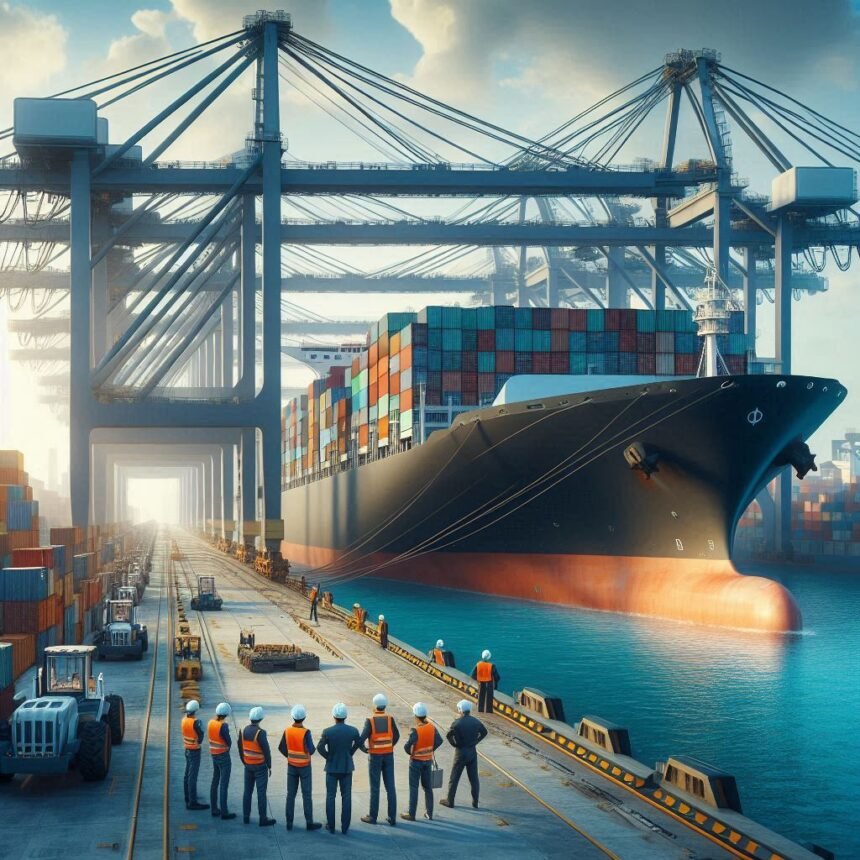Introduction to Breakbulk Cargo
Breakbulk cargo, also known as general cargo, refers to goods that are transported individually rather than in containers. Unlike containerized cargo, which is consolidated into standardized containers, breakbulk cargo is handled and transported as separate units. This category includes a wide range of items such as machinery, vehicles, construction materials, and heavy equipment. Given the diversity and often oversized nature of these goods, breakbulk cargo requires specialized handling and transportation methods.
The primary characteristic that sets breakbulk cargo apart from other types of cargo is its individuality. Each piece of cargo is unique in shape, size, and weight, necessitating customized loading and unloading procedures. For instance, transporting a piece of heavy machinery involves different logistics compared to shipping a bulk commodity like grain or oil. The need for individualized handling makes breakbulk shipments more complex and time-consuming, which in turn influences the cost and risk associated with their transport.
Common examples of breakbulk cargo include industrial machinery, construction equipment, oversized vehicles, and large structural components. These items are often too large or irregularly shaped to fit into standard shipping containers, thereby requiring special handling equipment such as cranes, forklifts, and custom rigging. The complexity involved in moving such items underscores the importance of marine cargo insurance, which provides financial protection against the unique risks associated with breakbulk shipments.
Understanding the nature and characteristics of breakbulk cargo is essential for recognizing the need for specialized insurance coverage. Breakbulk cargo insurance is designed to address the specific risks involved in the transport of these individual and often valuable items. Unlike standard marine insurance, which may cover containerized or bulk shipments, breakbulk cargo insurance offers tailored protection that takes into account the unique challenges posed by these types of goods. This specialized coverage ensures that the financial interests of all parties involved in the shipment are adequately safeguarded.
The Importance of Breakbulk Cargo Insurance
Breakbulk cargo insurance is indispensable due to the inherent risks and complexities involved in transporting breakbulk shipments. Unlike containerized cargo, breakbulk cargo involves the transportation of goods that are too large or too heavy to be placed in standard shipping containers. This includes items such as machinery, construction materials, and vehicles, which are often transported individually or in smaller packages. The unique nature of breakbulk cargo increases its susceptibility to various risks.
One of the primary risks associated with breakbulk cargo is the potential for damage during handling. The process of loading and unloading breakbulk items is labor-intensive and often involves the use of cranes and other heavy machinery. This increases the likelihood of accidents or mishandling, which can result in significant damage to the cargo. Additionally, the irregular shapes and sizes of breakbulk items make them more prone to damage during transit.

Theft is another significant risk for breakbulk cargo. Due to the high value of many breakbulk items, they are often targeted by thieves. The open nature of breakbulk shipments, where items are not enclosed in containers, further exacerbates this risk. Comprehensive breakbulk cargo insurance can provide coverage against such losses, ensuring that businesses are not left financially vulnerable in the event of theft.
Weather-related incidents also pose a substantial threat to breakbulk cargo. Severe weather conditions such as storms, hurricanes, and heavy rains can lead to damage or loss of cargo. For instance, during a storm, unsecured breakbulk items can shift and collide, causing significant damage. Marine cargo insurance, which includes coverage for weather-related incidents, is vital for mitigating these risks.
The complexity and value of breakbulk shipments necessitate comprehensive insurance coverage. High-value items such as industrial machinery or specialized equipment require protection against potential losses. For example, a case study involving an international construction company demonstrated the importance of marine insurance when a shipment of construction equipment was damaged during transit. The insurance coverage enabled the company to recover the cost of the damaged equipment, thereby preventing financial loss and project delays.
In conclusion, breakbulk cargo insurance is essential for safeguarding against the unique risks associated with transporting breakbulk shipments. From handling damage and theft to weather-related incidents, comprehensive insurance coverage ensures that businesses can navigate these challenges with confidence.
Types of Coverage in Breakbulk Cargo Insurance
When it comes to breakbulk cargo insurance, understanding the different types of coverage available is crucial for securing adequate protection for your shipments. The primary coverage options include all-risk coverage, named perils coverage, and liability coverage, each offering varying levels of protection tailored to specific needs.
All-risk coverage is the most comprehensive option, safeguarding against a wide range of potential risks. This type of marine cargo insurance covers virtually any fortuitous loss or damage to the cargo, except for those explicitly excluded in the policy. Common exclusions might include damage due to improper packing, inherent vice, or delay. Despite these exclusions, all-risk coverage remains a popular choice for its extensive protection.
Named perils coverage, on the other hand, provides protection against specific risks listed in the policy. Typically, these perils include events such as fire, lightning, explosion, and theft, among others. While this type of coverage may be less comprehensive than all-risk coverage, it allows for more targeted protection based on the most likely threats to the cargo.
Liability coverage is another critical component of breakbulk cargo insurance. This coverage protects against legal liability for loss or damage to third-party property or injury to third parties that might occur during the transportation of the breakbulk cargo. It is particularly important for carriers and shipping companies to mitigate potential legal and financial repercussions.
Beyond these fundamental coverage options, there are additional endorsements that can be added to a breakbulk cargo insurance policy to enhance protection. Coverage for delay, for instance, compensates for financial losses due to shipment delays. Loss of market coverage protects against the depreciation in value of the cargo due to delays. War risks coverage addresses damage or loss resulting from war-related events, which can be particularly relevant for shipments passing through conflict zones.
Understanding these various coverage options and endorsements allows stakeholders to tailor their marine insurance policies to their specific needs, ensuring comprehensive protection for their breakbulk cargo. By carefully selecting the appropriate coverage, businesses can mitigate risks and safeguard their valuable shipments effectively.
How to Choose the Right Breakbulk Cargo Insurance Policy
Choosing the right breakbulk cargo insurance policy is a critical step in safeguarding your valuable shipments. To make an informed decision, it is essential to evaluate and compare different insurance providers and policies meticulously. Here are some practical steps to guide you through this process.

First, consider the scope of coverage offered by each potential policy. Breakbulk cargo insurance should protect against a range of risks, including physical damage, theft, and natural disasters. Ensure that the policy covers all modes of transport involved in your cargo’s journey, whether by sea, air, or land.
Another critical factor to examine is the policy limits, which define the maximum amount the insurer will pay in the event of a claim. It’s important to choose a policy with limits that adequately reflect the value of your cargo. Underinsuring your shipment can lead to significant financial losses if a claim exceeds the policy limit.
Deductibles also play a crucial role in selecting the right insurance policy. A deductible is the amount you are required to pay out-of-pocket before the insurance coverage kicks in. While higher deductibles can lower your premium costs, they also increase your financial responsibility in the event of a claim. Carefully weigh the pros and cons of different deductible options to find a balance that suits your financial situation.
The reputation of the insurance provider is another essential consideration. Research the insurer’s track record, financial stability, and customer service quality. Reading reviews and testimonials from other clients can provide valuable insights into the insurer’s reliability and the ease of the claims process.
Working with experienced insurance brokers can also be beneficial. Brokers can offer expert advice, help you navigate policy terms and conditions, and assist in negotiating better coverage options. They act as intermediaries between you and the insurer, ensuring that your specific needs are met.
Finally, thoroughly read and understand the policy terms and conditions before making a commitment. Pay close attention to any exclusions, limitations, and special clauses that could affect your coverage. Seeking clarification on any ambiguous terms will prevent misunderstandings and ensure that you are fully aware of what your policy entails.
By following these steps and considering these factors, you can select a breakbulk cargo insurance policy that provides comprehensive protection for your shipments, giving you peace of mind as your goods travel across the globe.









